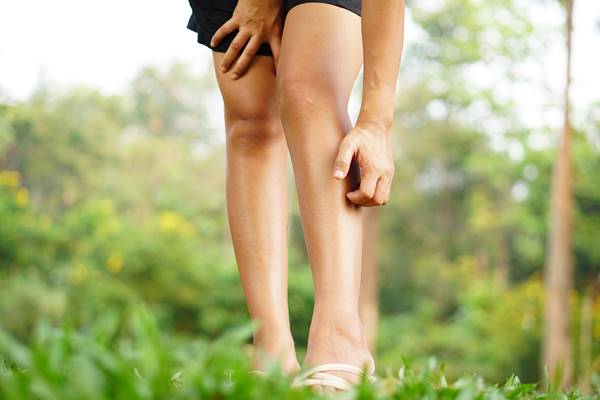Varicose veins are a common problem that affects millions of people worldwide. They are swollen, twisted, and enlarged veins that usually occur in the legs and feet.
While varicose veins are not always a serious condition, they can cause discomfort, pain, and itching. Itching is one of the most common symptoms of varicose veins and can be quite bothersome. The constant urge to scratch can lead to skin irritation and even infection if left untreated.
Fortunately, there are several remedies available that can help alleviate varicose vein itching. These remedies range from natural treatments such as exercise and diet changes to medical interventions such as compression stockings or laser therapy.
It is important to consult with a healthcare provider before trying any new treatment or remedy for varicose vein itching.

Understanding the causes of Itchiness due to Varicose Veins
Varicose veins itching is a common symptom experienced by those suffering from varicose veins. Varicose veins are caused by the weakening of vein walls, leading to the pooling of blood and swelling. This pooling of blood can cause itching in the affected area due to inflammation and irritation of the skin.
Other factors that can contribute to varicose veins itching include obesity, pregnancy, standing or sitting for long periods, and genetics.
These factors lead to increased pressure on the veins, making them more susceptible to damage and inflammation. Itching caused by varicose veins can be alleviated through various remedies such as wearing compression stockings, elevating legs when resting, avoiding tight clothing, and maintaining a healthy weight. Additionally, over-the-counter creams containing menthol or camphor can provide temporary relief from itching. Understanding the causes of varicose vein itching is crucial in effectively managing this symptom.
Topical Treatments For Varicose Veins Itching
Topical treatments for varicose veins itching can provide relief and reduce inflammation. One effective treatment is applying aloe vera gel to the affected area. Aloe vera has anti-inflammatory properties that can soothe the skin and reduce itching.
Another option is using witch hazel, which is a natural astringent that can help reduce swelling and itching.
Applying apple cider vinegar to the affected area can also provide relief due to its anti-inflammatory properties.
Arnica cream or gel is another topical treatment that can help with varicose veins itching. It contains compounds that have anti-inflammatory and pain-relieving effects, making it an effective remedy for this condition.
Finally, menthol-based creams or gels can provide cooling relief from itching by numbing the affected area temporarily.
While these topical treatments may offer temporary relief from varicose veins itching, it’s important to address the underlying cause of the condition through lifestyle changes or medical treatment for long-term relief.
Natural Remedies For Varicose Veins Itching
Varicose veins are a common condition that affects millions of people worldwide. Itching is a common symptom of varicose veins and can be quite uncomfortable. While there are many treatments available for varicose veins, natural remedies can also be effective in reducing itching and other symptoms.
One natural remedy for varicose veins itching is apple cider vinegar. Applying a mixture of apple cider vinegar and water to the affected area can help reduce inflammation and itchiness.
Another remedy is witch hazel, which has anti-inflammatory properties and can soothe irritated skin.
Horse chestnut seed extract is another natural remedy that has been shown to improve circulation and reduce inflammation in the legs.
Similarly, grape seed extract has antioxidant properties that can help protect blood vessels from damage.
Finally, regular exercise such as walking or swimming can help improve circulation and reduce symptoms of varicose veins, including itching.
Lifestyle Changes To Help Relieve Itchy Varicose Veins
If you suffer from varicose veins, you know how uncomfortable and itchy they can be. Fortunately, there are some lifestyle changes you can make to help relieve the itching and improve your overall vein health.
One of the most important things you can do is exercise regularly. This helps to improve circulation and strengthen the muscles in your legs, which can reduce the appearance of varicose veins and alleviate itching.
Another key lifestyle change is to maintain a healthy weight. Excess weight puts extra pressure on your veins, which can worsen symptoms like itching.
Additionally, wearing compression stockings can help improve blood flow and reduce swelling in your legs. Be sure to wear them as directed by your healthcare provider.
Finally, try to avoid sitting or standing for long periods of time without taking breaks to move around or stretch. This will help keep blood flowing through your veins and reduce discomfort.
Medical Treatments For Severe Itching Symptoms
When varicose veins cause severe itching, medical treatments may be necessary.
One option is Sclerotherapy, in which a solution is injected into the affected vein to cause it to close and eventually fade away.
Another option is endovenous laser treatment (EVLT), in which a laser fiber is inserted into the vein and heat is used to close it off.
Both of these treatments can be effective in reducing itching and improving the appearance of varicose veins.
For more severe cases, surgery may be necessary. There are several types of surgery for varicose veins, including vein stripping and ligation, ambulatory phlebectomy, and endoscopic vein surgery. These procedures involve removing or closing off the affected veins through small incisions in the skin.
It is important to consult with a healthcare professional before undergoing any medical treatment for varicose veins itching. They can recommend the best course of action based on individual needs and medical history.